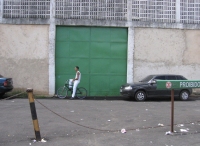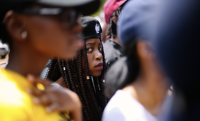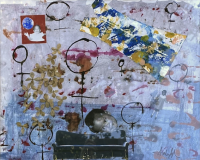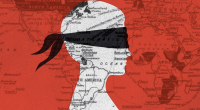 Growing up, Felipe Adão had to navigate two worlds: one as a Brazilian, the other as an Afro-Brazilian. He studied at private schools, but lived in an underprivileged area of Campinas, a city in the state of São Paulo. Both his friends from school and his friends from the street had an influence on his upbringing.
Growing up, Felipe Adão had to navigate two worlds: one as a Brazilian, the other as an Afro-Brazilian. He studied at private schools, but lived in an underprivileged area of Campinas, a city in the state of São Paulo. Both his friends from school and his friends from the street had an influence on his upbringing.
Games Without Borders
21.10.2022 | by Jessy Damba Diamba
 This series continues the investigations that singularise Chagas’ work, namely the attention to the experiential and affective relationships that subjects establish with everyday objects and spaces, countering fast rhythms of consumption through a decelerated gaze that closely scrutinises discarded materials, shapes and textures. However, the series simultaneously marks a kind of turning point, insofar as, unlike previous series carried out in various urban public spaces to the North and South, vaguely identified (the streets and beaches of Luanda, Venice, London and Newport, etc.), in this series, for the first time, the photographer focused on the indoors and outdoors of a specific architecture.
This series continues the investigations that singularise Chagas’ work, namely the attention to the experiential and affective relationships that subjects establish with everyday objects and spaces, countering fast rhythms of consumption through a decelerated gaze that closely scrutinises discarded materials, shapes and textures. However, the series simultaneously marks a kind of turning point, insofar as, unlike previous series carried out in various urban public spaces to the North and South, vaguely identified (the streets and beaches of Luanda, Venice, London and Newport, etc.), in this series, for the first time, the photographer focused on the indoors and outdoors of a specific architecture.
I'll visit
29.09.2022 | by Ana Balona de Oliveira
 Stuart Hall’s ironic use of “the west and the rest” is very real in the fixation among South Africans with “us” and “Africa”. It was encouraging that a sense of South Africa’s inextricable connectedness to the rest of the continent surfaced at moments in the FMF struggle. But the curiosity about and interest in African politics, literature, and academic knowledge still hasn’t really taken off, whether among students or established scholars.
Stuart Hall’s ironic use of “the west and the rest” is very real in the fixation among South Africans with “us” and “Africa”. It was encouraging that a sense of South Africa’s inextricable connectedness to the rest of the continent surfaced at moments in the FMF struggle. But the curiosity about and interest in African politics, literature, and academic knowledge still hasn’t really taken off, whether among students or established scholars.
Face to face
30.05.2022 | by Sean Jacobs
 The long history of advocacy around “women’s rights are human rights” features activists from the Global South and women of color in the US. For instance, in 1945, at the founding of the United Nations, Latin American feminists played a critical role in trying to advance “women’s rights” into the category of human rights. And after World War II, when the US Black freedom movement often deployed human rights arguments, Pauli Murray, the attorney, feminist, and civil rights advocate, argued specifically that “women’s rights are a part of human rights.” What changed at the end of the 20th century was that a far-reaching and expanding global feminist movement began to collectively use the idea that “women’s rights are human rights” to advocate for change at the United Nations and beyond.
The long history of advocacy around “women’s rights are human rights” features activists from the Global South and women of color in the US. For instance, in 1945, at the founding of the United Nations, Latin American feminists played a critical role in trying to advance “women’s rights” into the category of human rights. And after World War II, when the US Black freedom movement often deployed human rights arguments, Pauli Murray, the attorney, feminist, and civil rights advocate, argued specifically that “women’s rights are a part of human rights.” What changed at the end of the 20th century was that a far-reaching and expanding global feminist movement began to collectively use the idea that “women’s rights are human rights” to advocate for change at the United Nations and beyond.
Body
08.10.2021 | by Lisa Levenstein
 This article demonstrates that antifeminist agendas (often labelled as anti-gender ideology by proponents) are key to understand how ethnonationalist, xenophobic and racist discourses are forwarded by far-right parties in Portugal and across Europe. Therefore, it focuses on the intersections between antifeminism, including femonationalism, and anti-immigration agendas, examining how gendered and racialized tropes are used in conjunction in far-right propaganda.
This article demonstrates that antifeminist agendas (often labelled as anti-gender ideology by proponents) are key to understand how ethnonationalist, xenophobic and racist discourses are forwarded by far-right parties in Portugal and across Europe. Therefore, it focuses on the intersections between antifeminism, including femonationalism, and anti-immigration agendas, examining how gendered and racialized tropes are used in conjunction in far-right propaganda.
To read
19.05.2021 | by Rita Santos and Sílvia Roque
 The events of the past six years have sharpened Gilroy's observations. At the same time, they have made it increasingly clear that, despite the real progress achieved, attempts to maintain privileges based on structural and systemic inequality, whether in terms of class, gender or race, have become even more obstinate. Attempts that go hand in hand with the futile but devastating efforts to deny history and impose the erasure of memory.
The events of the past six years have sharpened Gilroy's observations. At the same time, they have made it increasingly clear that, despite the real progress achieved, attempts to maintain privileges based on structural and systemic inequality, whether in terms of class, gender or race, have become even more obstinate. Attempts that go hand in hand with the futile but devastating efforts to deny history and impose the erasure of memory.
To read
18.02.2021 | by Paulo de Medeiros
 Ignoring the central role of race and colonialism in world affairs precludes an accurate understanding of the modern state system.
Worldwide protests against police racism and brutality and the toppling of statues commemorating white supremacists have led to a public reckoning in the United States and many other countries—forcing citizens and governments to confront the historical legacy of systemic racism and the enduring inequalities it has created.
Ignoring the central role of race and colonialism in world affairs precludes an accurate understanding of the modern state system.
Worldwide protests against police racism and brutality and the toppling of statues commemorating white supremacists have led to a public reckoning in the United States and many other countries—forcing citizens and governments to confront the historical legacy of systemic racism and the enduring inequalities it has created.
Games Without Borders
16.02.2021 | by Gurminder K. Bhambra, Yolande Bouka , Randolph B. Persaud, Olivia U. Rutazibwa, Vineet Thakur, Duncan Bell, Karen Smith, Toni Haastrup and Seifudein Adem
 Politics isn’t, first and foremost, a matter of making allegations and raising awareness; there is no one straw that breaks the camel’s back, and what’s bad can be tolerated indefinitely. Instead, it is a sort of shedding of the skin, by which we become sensitive to this or allergic to that. Nor has it much to do with convincing (discourse), or seducing (marketing), but rather with opening all sorts of spaces to experience another way of living, another definition of reality, another vision of the world. In the struggle for hegemony, the skin – yours, mine, everyone’s – is the battlefield. JEUX SANS FRONTIÈRES #2
Politics isn’t, first and foremost, a matter of making allegations and raising awareness; there is no one straw that breaks the camel’s back, and what’s bad can be tolerated indefinitely. Instead, it is a sort of shedding of the skin, by which we become sensitive to this or allergic to that. Nor has it much to do with convincing (discourse), or seducing (marketing), but rather with opening all sorts of spaces to experience another way of living, another definition of reality, another vision of the world. In the struggle for hegemony, the skin – yours, mine, everyone’s – is the battlefield. JEUX SANS FRONTIÈRES #2
Games Without Borders
11.02.2018 | by Amador Fernández-Savater
 Growing up, Felipe Adão had to navigate two worlds: one as a Brazilian, the other as an Afro-Brazilian. He studied at private schools, but lived in an underprivileged area of Campinas, a city in the state of São Paulo. Both his friends from school and his friends from the street had an influence on his upbringing.
Growing up, Felipe Adão had to navigate two worlds: one as a Brazilian, the other as an Afro-Brazilian. He studied at private schools, but lived in an underprivileged area of Campinas, a city in the state of São Paulo. Both his friends from school and his friends from the street had an influence on his upbringing.  This series continues the investigations that singularise Chagas’ work, namely the attention to the experiential and affective relationships that subjects establish with everyday objects and spaces, countering fast rhythms of consumption through a decelerated gaze that closely scrutinises discarded materials, shapes and textures. However, the series simultaneously marks a kind of turning point, insofar as, unlike previous series carried out in various urban public spaces to the North and South, vaguely identified (the streets and beaches of Luanda, Venice, London and Newport, etc.), in this series, for the first time, the photographer focused on the indoors and outdoors of a specific architecture.
This series continues the investigations that singularise Chagas’ work, namely the attention to the experiential and affective relationships that subjects establish with everyday objects and spaces, countering fast rhythms of consumption through a decelerated gaze that closely scrutinises discarded materials, shapes and textures. However, the series simultaneously marks a kind of turning point, insofar as, unlike previous series carried out in various urban public spaces to the North and South, vaguely identified (the streets and beaches of Luanda, Venice, London and Newport, etc.), in this series, for the first time, the photographer focused on the indoors and outdoors of a specific architecture.  Stuart Hall’s ironic use of “the west and the rest” is very real in the fixation among South Africans with “us” and “Africa”. It was encouraging that a sense of South Africa’s inextricable connectedness to the rest of the continent surfaced at moments in the FMF struggle. But the curiosity about and interest in African politics, literature, and academic knowledge still hasn’t really taken off, whether among students or established scholars.
Stuart Hall’s ironic use of “the west and the rest” is very real in the fixation among South Africans with “us” and “Africa”. It was encouraging that a sense of South Africa’s inextricable connectedness to the rest of the continent surfaced at moments in the FMF struggle. But the curiosity about and interest in African politics, literature, and academic knowledge still hasn’t really taken off, whether among students or established scholars.  The long history of advocacy around “women’s rights are human rights” features activists from the Global South and women of color in the US. For instance, in 1945, at the founding of the United Nations, Latin American feminists played a critical role in trying to advance “women’s rights” into the category of human rights. And after World War II, when the US Black freedom movement often deployed human rights arguments, Pauli Murray, the attorney, feminist, and civil rights advocate, argued specifically that “women’s rights are a part of human rights.” What changed at the end of the 20th century was that a far-reaching and expanding global feminist movement began to collectively use the idea that “women’s rights are human rights” to advocate for change at the United Nations and beyond.
The long history of advocacy around “women’s rights are human rights” features activists from the Global South and women of color in the US. For instance, in 1945, at the founding of the United Nations, Latin American feminists played a critical role in trying to advance “women’s rights” into the category of human rights. And after World War II, when the US Black freedom movement often deployed human rights arguments, Pauli Murray, the attorney, feminist, and civil rights advocate, argued specifically that “women’s rights are a part of human rights.” What changed at the end of the 20th century was that a far-reaching and expanding global feminist movement began to collectively use the idea that “women’s rights are human rights” to advocate for change at the United Nations and beyond.  This article demonstrates that antifeminist agendas (often labelled as anti-gender ideology by proponents) are key to understand how ethnonationalist, xenophobic and racist discourses are forwarded by far-right parties in Portugal and across Europe. Therefore, it focuses on the intersections between antifeminism, including femonationalism, and anti-immigration agendas, examining how gendered and racialized tropes are used in conjunction in far-right propaganda.
This article demonstrates that antifeminist agendas (often labelled as anti-gender ideology by proponents) are key to understand how ethnonationalist, xenophobic and racist discourses are forwarded by far-right parties in Portugal and across Europe. Therefore, it focuses on the intersections between antifeminism, including femonationalism, and anti-immigration agendas, examining how gendered and racialized tropes are used in conjunction in far-right propaganda.  The events of the past six years have sharpened Gilroy's observations. At the same time, they have made it increasingly clear that, despite the real progress achieved, attempts to maintain privileges based on structural and systemic inequality, whether in terms of class, gender or race, have become even more obstinate. Attempts that go hand in hand with the futile but devastating efforts to deny history and impose the erasure of memory.
The events of the past six years have sharpened Gilroy's observations. At the same time, they have made it increasingly clear that, despite the real progress achieved, attempts to maintain privileges based on structural and systemic inequality, whether in terms of class, gender or race, have become even more obstinate. Attempts that go hand in hand with the futile but devastating efforts to deny history and impose the erasure of memory.  Ignoring the central role of race and colonialism in world affairs precludes an accurate understanding of the modern state system.
Worldwide protests against police racism and brutality and the toppling of statues commemorating white supremacists have led to a public reckoning in the United States and many other countries—forcing citizens and governments to confront the historical legacy of systemic racism and the enduring inequalities it has created.
Ignoring the central role of race and colonialism in world affairs precludes an accurate understanding of the modern state system.
Worldwide protests against police racism and brutality and the toppling of statues commemorating white supremacists have led to a public reckoning in the United States and many other countries—forcing citizens and governments to confront the historical legacy of systemic racism and the enduring inequalities it has created.  Politics isn’t, first and foremost, a matter of making allegations and raising awareness; there is no one straw that breaks the camel’s back, and what’s bad can be tolerated indefinitely. Instead, it is a sort of shedding of the skin, by which we become sensitive to this or allergic to that. Nor has it much to do with convincing (discourse), or seducing (marketing), but rather with opening all sorts of spaces to experience another way of living, another definition of reality, another vision of the world. In the struggle for hegemony, the skin – yours, mine, everyone’s – is the battlefield. JEUX SANS FRONTIÈRES #2
Politics isn’t, first and foremost, a matter of making allegations and raising awareness; there is no one straw that breaks the camel’s back, and what’s bad can be tolerated indefinitely. Instead, it is a sort of shedding of the skin, by which we become sensitive to this or allergic to that. Nor has it much to do with convincing (discourse), or seducing (marketing), but rather with opening all sorts of spaces to experience another way of living, another definition of reality, another vision of the world. In the struggle for hegemony, the skin – yours, mine, everyone’s – is the battlefield. JEUX SANS FRONTIÈRES #2 